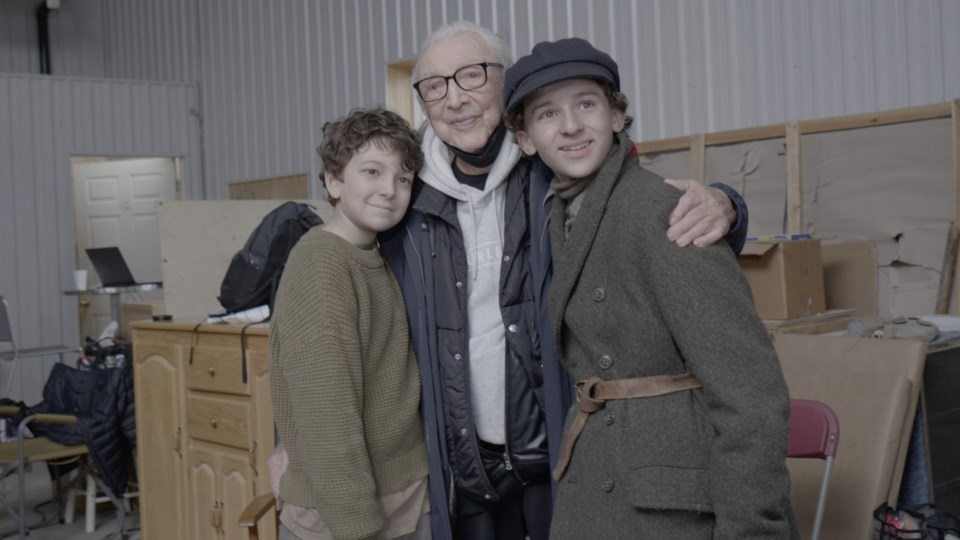Maxwell Smart was just 11 years old when he lost his family in the Holocaust.
In 1941, German forces were loading his mother and little sister into a truck after occupying the Polish city of Buchach, now part of Ukraine, when his mother urged him to run into a nearby forest. The Jewish-born Smart lived alone for months, subsisting on wild mushrooms while evading the occasional German soldier who patrolled the woods.
Eventually, Smart met another boy in hiding, Yanek, and they built a bunker in the ground to survive the winter. After a massacre of Jews in a nearby town, the boys discovered a baby, still alive in her dead mother's arms, and crossed a freezing river to rescue her.
More than eight decades later, the 94-year-old Smart lives in Montreal and says it feels "unbelievable" to see his incredible story now hit the big screen as a dramatized feature film, “The Boy in the Woods.” He says he kept the harrowing tale secret for most of his life but that director Rebecca Snow convinced him it offered important lessons about the impact of war.
“She was right; my story should be told to the world. I should show the horror and the misery that I went through. I didn't go through a real Holocaust story. I have a survival story," Smart says in a recent video call from Montreal.
“I wanted to show what grown-ups, people with brains who run countries, could do to little children. Innocent little children.”
Smart says the experience was too painful to share for decades until his wife convinced him to write it down. His memoir, “The Boy in the Woods," came out in 2018.
Snow persuaded Smart to share his story as part of her 2019 documentary “Cheating Hitler: Surviving the Holocaust.”
Then, the Toronto writer-director convinced him his story should be made into a dramatic film.
“I didn't want to write a book, not because I didn't know the importance (of it), but to go back to my past, it was too painful and I didn't want to relive what I went through,” says Smart, who immigrated to Canada as an orphan in 1948.
“So I kept it quiet. I didn't want to talk about it. As a matter of fact, my family didn't know about it. My children didn't know about it. Nobody knew.”
Snow, who wrote and directed the film, describes it as "a warning from history."
"We live in very distressing times of racial violence. We see a rise in antisemitism, we see a rise in Islamophobia — lots of different forms of racial violence and so much polarizing rhetoric,” Snow says from Toronto about the film, which was shot in North Bay, Ont., in 2022
“This story just shows how seriously dangerous that can be when taken to an extreme. But it really is a story of survival. It’s a story of compassion and resilience and hope really triumphing over hatred and fear and dehumanization.”
Much of the film is carried by 15-year-old Jett Klyne, of Penticton, B.C. He says Smart’s story resonated with him because his great-grandmother is a Holocaust survivor.
“It was really important to me because it's been a part of my family and I know that even a lot of kids today have no idea what the Holocaust is," says Klyne, who appeared in Disney Plus’ Marvel series “WandaVision.”
Smart recalls a moment on set when Klyne ran into his arms in tears after filming an especially sorrowful scene with Toronto's David Kohlsmith, who plays Yanek.
“He cried and I cried with him,” Smart says.
“This little young boy did not act as Max, he lived and became Max himself. I could not stop him from crying for half an hour. All the performers and all the crew cried together.”
Klyne says he cried so much while filming the scene that it no longer felt like he was acting, and that he gained a deeper emotional understanding of the horrors of the Holocaust.
“(After the scene) I found Max and I just fell into his arms. I felt so bad for anyone who had to go through that,” he says.
Smart hopes his story conveys the grave impact genocides have on innocent children.
“Things like this should never happen. They should be never forgotten. The Holocaust should never be forgotten. It is being forgotten. Many Holocausts are forgotten,” he says.
“This is what I want people to remember: children suffer. Every family has children and their children are the people who suffer most. My sister, a five-year-old, didn't even know what a Jew was. She had no idea why she was killed for nothing. That’s the message I would like people to understand.”
"The Boy in the Woods" opens Friday in select theatres.
This report by The Canadian Press was first published June 19, 2024.
Alex Nino Gheciu, The Canadian Press



